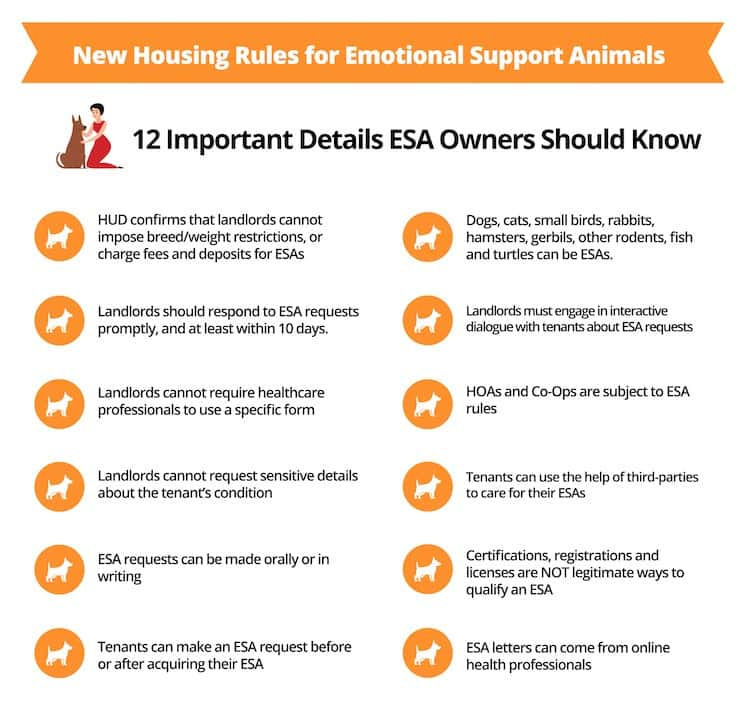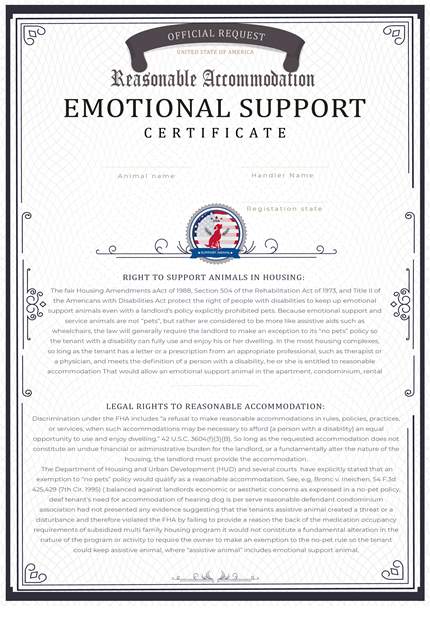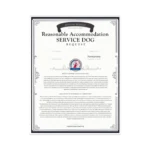How to rent an apartment with support animal
Every day the number of men having registered emotional support animals that help them cope with various psycho-emotional maladies is increasing. Many scientific studies in this field show the undeniable positive impact of animals on the mental state of a person. For example, ESAs help to cope with depression, make adjustments to the owner’s usual daily routine and make his or her life more eventful and active. Thanks to this, a human gets not only mood improvements and mental health stabilization but also the betterment of physical well-being. That is why emotional support animals in many countries are recommended to their patients by experienced therapists and psychologists.
Of course, if you live in your own house or flat, there are no problems to live with a pet. But in big cities, people most often have to rent a home. There are frequent cases when the landlord is categorically against living animals in his house, about which he or she is obliged to notify the tenants in advance. But do not forget that an emotional support animal is not just a pet. This is primarily a friend and companion, which at the same time is one of the key components of the treatment of a person’s mental issues. That is why, in most cases, the landlord is obliged to permit accommodation with the ESA. In this article, we will tell you what is needed for this and how to avoid conflict situations and ESA discrimination.
Getting an ESA letter


What you need to do first is to collect all the necessary paperwork. For support animals, the main document is an ESA letter given by any competent expert. This paper confirms that you have any kind of frustration that requires ESA endorsement. An official ESA letter must be written on solemn letterhead and contain information about the specialist who issued it.
The ESA letter can be received in person from your therapist or online. To do this, you need to contact a qualified licensed professional who has sufficient knowledge and experience in the field of emotional support animals and their impact on the human state. The specialist will determine how ESA therapy will be useful for you and will issue you the necessary paperwork. You can read more about How to Get an Emotional Support Animal Letter From a Doctor in our blog.
Explore ESAs housing rights

If you want to avoid conflicts and misunderstandings, you need to study the rights of emotional support animals carefully. According to the ADA, the ESA is not a service animal, so the rights of a registered emotional support animal are somewhat limited in everyday life. For example, an ESA cannot freely accompany its master wherever he goes. ESAs are also subject to certain restrictions during air travel, so your pet may not be allowed to fly alongside you in the cabin.
At the same time, there are no such restrictions in the field of housing for ESA. The main and in fact the only law that gives you and your animal the right to live together even in buildings where pets are prohibited is the Fair Housing Act. It is this law that you should rely on when renting an apartment with an emotional support animal. It also regulates both the freedoms of the ESAs and their handlers and the freedoms of the landlord and will help, if necessary, protect the rights of the parties.
Fair Housing Act
The FHA was issued to avoid discrimination by landlords against their tenants with special needs. Foremost, it applied to racial and gender discrimination, but now it is increasingly applied to people with inabilities and their pet helpers. This group includes people with mental disturbances and their emotional support animals.
According to the FHA, a housing provider cannot forbid or evict its tenants with registered emotional support animals, except in certain cases provided by law. ESAs can even be accommodated in buildings where pets are absolutely banned. In this case, the landlord cannot require an additional fee or take a deposit for the accommodation of the animal. In the event of a dispute or conflict, tenants can contact the Department of Housing and Urban Development to resolve their situation at the official level. The landlord may be subject to fines or other restrictions provided for by law.
At the same time, the FHA protects the rights of the landlord. For example, he or she may place restrictions on the ESA’s presence in public access areas of a building such as a lobby or an elevator. If the animal causes damage to property or poses a threat to other habitats, the housing provider may ask you and your animal to move out and pay for damages.
How to Talk to a landlord about ESA


But before you conflict and threaten litigation, you should talk with the landlord. Most of them know the law and will not ban you from living with an ESA if you provide sufficient evidence. Submit a formal housing accommodation request to your landlord. He must respond to it within 10 days. In most cases, the answer should be yes.
The law does not oblige housing providers to specially equip buildings for the living of emotional support animals. So don’t ask too much. At the same time, in any dialogue, there is a human component. Try to explain your needs to the landlord and show your willingness to compromise and solve possible problems together. This will also work in your favor.
Also, by law, if you provide an ESA letter from a licensed professional, the landlord may not ask you about the details of your diagnosis, symptoms, or treatment. Everything he needs to know is in the documents, the disclosure of the rest of the information depends only on you.
ESA Animal requirements
Despite all the existing laws, there are also a number of requirements for emotional support animals both in appearance and behavior. First of all, the animal must be allowed as an ESA in the state. Most people usually choose dogs or cats for this role, but some prefer more exotic pets, so make sure the animal is legal.
The animal must have a veterinary certificate and all necessary vaccinations. It is also required to monitor carefully the appearance of your pet. You should bathe him regularly, comb him out and take him to the groomer for all the necessary procedures. Especially during molting.
Separately, it is worth mentioning the ESA letter once again. If the tenant refuses to provide an ESA letter or provides a fake document, the landlord has the right not only to deny accommodation but also to contact the relevant government authorities.
Rules of conduct for ESA

Emotional support animals do not receive special training because they do not have to perform any specific physical tasks. However, it is worth taking the time and attention to teach the animal the basic commands and rules of behavior. Commands such as “Sit”, “Right” or “Quiet” will help you a lot in your daily life with a support animal dog.
In addition, the animal must be obedient. It must not damage property. Most often, animals do this to get the attention of the owner, so make sure that the animal does not get bored while you are not at home. Buy him some toys, provide him with proper nutrition and, of course, give him enough attention. Especially during walks and training, when the pet can release all the accumulated energy.
Another important requirement is that the animal must not show aggression toward other people or animals. Often pets seek to protect their owners at all costs, so it is important to constantly train obedience and calmness in order to avoid such situations. Any of these violations may be grounds for your landlord to evict you.
Can a landlord deny accommodation with an Emotional Support Animal?


Landlords cannot deny the accommodation with an emotional support animal because of their own dislike of animals or because, for example, he or she likes cats rather than dogs. But if your animal is too big, may pose a threat to others, or cause damage to property, the housing provider has the right to politely refuse you.
If he or she has enough reason to deny your housing accommodation request, he or she may do so formally by contacting official government agencies. In other cases, refusing to accommodate a tenant with an ESA may be considered discrimination.
How to avoid ESA discrimination?


Discrimination in this case can be shown in two forms. First, the landlord cannot ban you from renting an apartment with an ESA because of the breed or weight of the animal. Secondly, the landlord cannot require an additional fee or deposit for possible losses.
And you have two ways to deal with such situations. You can contact special services to resolve the conflict. It will take some time, but as a result, you will receive an official document confirming the unlawful actions of the landlord. However, human relationships will be damaged.
First of all, try to talk to the housing provider, perhaps in the course of the dialogue, you will be able to find a compromise. Often such a compromise is a small deposit, which, in case of damage caused by the animals, will be used for repairs. If such a need does not arise, the deposit in full will be returned to the tenants.























